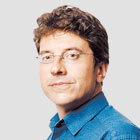Is transparency bad for science?
Transparency in science is in the news these days, from leaked emails on climate change to unpublished drugs trials and information being kept out of the public domain for reasons of confidentiality or copyright. But calls for transparency and openness are almost always met with claims that scientific research is potentially at risk from persistent FOI requests or demands from the public to make science more easily accessible.
Should raw data be available to everyone? What is the value of transparency? Is the sharing of NHS patient data an example of good transparency? Who defines what open access means?
These questions and others were up for discussion at Index on Censorship’s “Data Debate” at Imperial College last night, marking the publication of the new issue of the magazine, “Dark matter: What’s science got to hide?” The event was chaired by the magazine’s editor, Jo Glanville.
The philosopher Baroness O’Neill opened the discussion by pointing out that the Protection of Freedoms Bill places greater pressure on academics, calling as it does for openness. But this is not a new concept for scientists — the Royal Society is based on openness, viewing science as a public enterprise. What was difficult, she said, at a time when transparency is so valued by so many, is how open data might be “reusable” in a way that is useful and productive.
Sir Mark Walport, director of the Wellcome Trust, agreed. “Science”, he said, “has led the way with openness”. But he warned against the dangers of raw data, which he likened to raw sewage (easily the most tweeted comment of the night, and repeated throughout the event’s discussion). Like O’Neill, Walport called for “useful” data sets to be available to the public so that serious misinterpretation of this unsorted data did not stand in the way of public knowledge.
But the journalist and campaigner George Monbiot called for full access to data, saying that it was counterproductive to allow scientists to determine who accesses information. He spoke of the public’s suspicion about science; at times communication between the scientific community and the public was simply a “tragedy of human incomprehension”. The public are told they need to know more and more about science and yet there are significant barriers to making this possible. He admitted the media were partly to blame, but stated that openness would help ease the public’s suspicion. As Fred Pearce writes in the magazine, “the fuss over climategate showed that the world is increasly unwilling to accept the message that ‘we are scientists; trust us’.”
Professor David Colquhoun called for greater openness in clinical trials. The competitive nature of the scientific community is exploited, he lamented, particularly within the drugs industry. As a result, important research is kept from the public, often because while clinical tests must be registered, the results do not have to be published. It’s a subject explored in detail by Deborah Cohen, BMJ investigations editor, in the current issue of the magazine too. Colquhoun offered that competition also meant that a huge amount of research was being carried out and not all of it to a good standard. Perhaps, he said, a reduction in the number of studies would bring about higher quality research.



